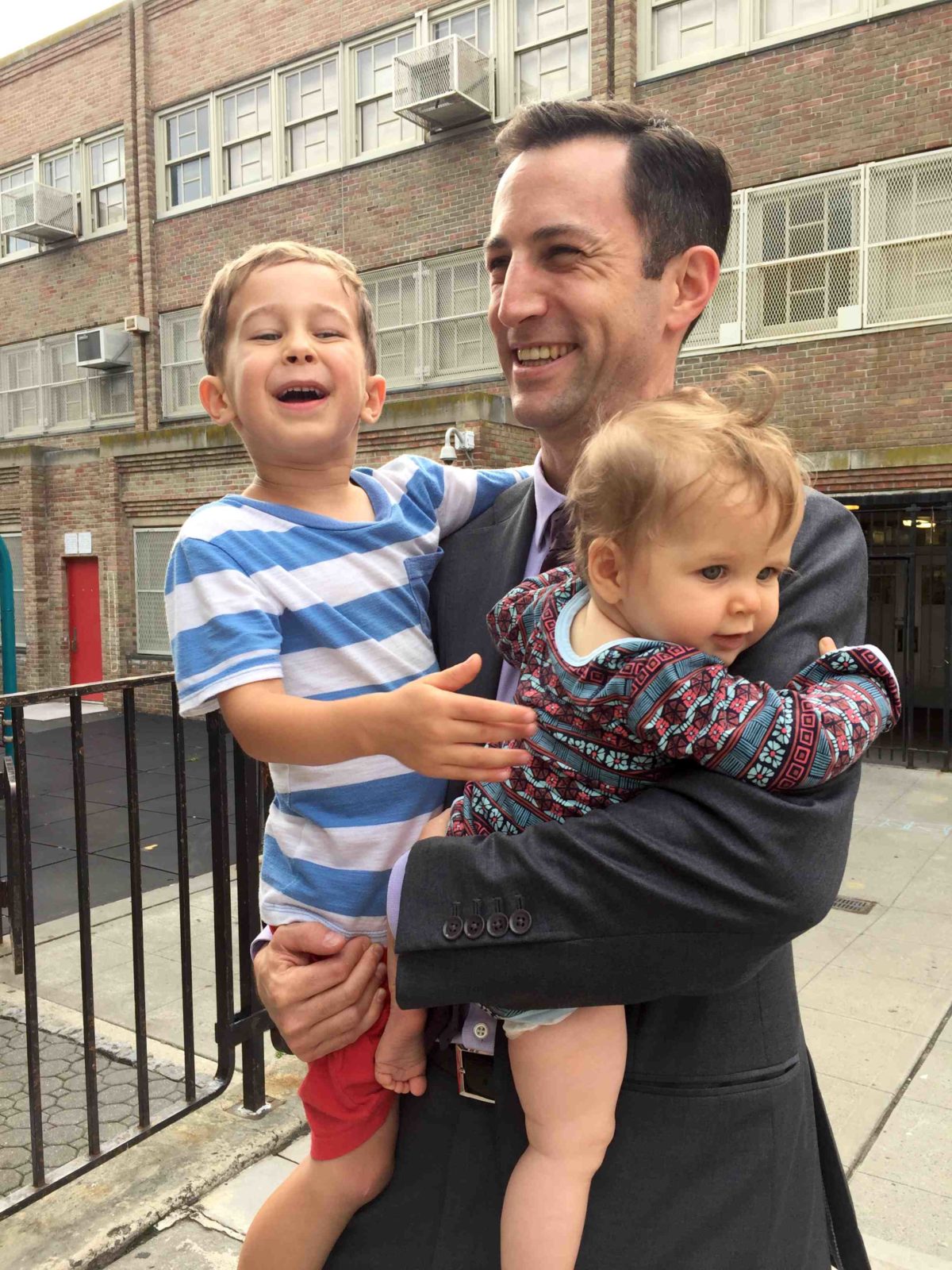Josh Breitbart has a rare status in the local tech scene. He’s a third-generation Brooklyn native.
As the first-ever senior advisor for broadband in the Mayor’s Office, Breitbart is aiming to get more New Yorkers, both natives and transplants, enmeshed in the booming tech industry by working to make the internet accessible throughout the city. Many of his efforts have been focused on Brooklyn: in particular, an expansion of Red Hook’s wireless network to the neighborhood’s small businesses and New York City Housing Authority buildings that will roll out in stages beginning later this year.
“There’s an increased amount of energy here,” the 41-year-old Breitbart told Technical.ly when we caught up with him at Grand Canyon Diner in Park Slope last month.
Breitbart, who sports a boyish grin and is eager to chat up the more wonky aspects of tech policy, is at home here. The diner’s not too far from the brownstone he grew up in, where he still lives (in a different apartment, that is) with his partner and two children. P.S. 321, the elementary school where he first gained exposure to computer programming — coding a tic-tac-toe game in Logo with a classmate — is across the street.
From summer flicks to City Hall
Breitbart’s upbringing indirectly guided him to his current work. His father was a filmmaker, and he briefly considered following in his dad’s footsteps. But by high school, he’d ruled filmmaking out as a career. Instead, Breitbart decided to heed a bit of advice his father gave him: Don’t make movies. Get into distribution instead.
That led him to cofound Rooftop Films, the annual outdoor summer film festival that’s become an anticipated event among film buffs. Breitbart started Rooftop Films in East Williamsburg and it’s since spread to venues across Brooklyn, Queens and Manhattan. From there, he moved on to the Midtown-based media production collective Indymedia, where he focused on online distribution. That’s when Breitbart first realized the power — and potential peril — of the internet.
There's no way to do technology alone. It confounds the whole nature of code.
“I learned that if there wasn’t democratic control of the internet, you could make great content, but it would fall on barren land,” he said.
As a result, Breitbart became a full-throated advocate for internet accessibility. In 2005, he moved to Philadelphia, where he wrote the case study for Wireless Philadelphia, the city’s failed initiative to offer free WiFi throughout the city. Later, back in New York City, he served as the director of field operations for the New America Foundation’s Open Technology Initiative, where he caught Mayor Bill de Blasio’s eye.
It was his work with the Red Hook Initiative that put Breitbart on de Blasio’s radar. At the New America Foundation, Breitbart partnered with the nonprofit, which was expanding its neighborhood wireless network after Superstorm Sandy with the help of its Digital Stewards youth program. That work came to national prominence after The Nation ran a story by Maya Wiley, Counsel to de Blasio, on the Red Hook Initiative.
In 2015, he was appointed the city’s senior advisor for broadband, a newly created role.
“When I saw we were headed toward a de Blasio administration, I was really excited for what a progressive mayor could do,” he said. “It was a total surprise to me how we got his attention.”
Broadband for stronger neighborhoods
Since joining the Mayor’s Office, Breitbart has continued to focus on expanding public internet access, which he finds especially useful for boosting collaboration among residents, businesses and organizations.
“There’s no way to do technology alone,” he said. “It confounds the whole nature of code.”
In addition to the Red Hook programs, last month, the New York City Economic Development Corporation (NYCEDC) launched a $5.3 million public-private partnership to expand wireless internet access in Long Island City and along the Brooklyn waterfront, including Sunset Park and Greenpoint. The city also has launched a broadband accessibility initiative for small businesses in East New York, which has seen increased chatter around development since being rezoned earlier this year.

At the Grand Canyon Diner. (Photo by April Joyner)
Despite the de Blasio administration’s focus on public internet access, residential internet access isn’t being ignored. The administration placed pressure on Time Warner Cable and Cablevision to offer more affordable broadband services, and earlier this year, their parent companies announced they would launch a $14.99/month service for qualifying low-income seniors, parents and guardians. But the near-monopoly status these companies have within particular neighborhoods, especially in Brooklyn, remains an issue.
“We’re looking at ways to expand service beyond those two options,” Breitbart said.
Expanding broadband access is one of several linchpins in the city’s strategy to boost economic development, particularly in traditionally industrial neighborhoods. But critics have expressed concern that this strategy could accelerate gentrification, displacing low-income residents and mom-and-pop retailers.
Breitbart gets it.
“If you can’t afford housing, then affordable broadband doesn’t do you any good,” he said.
That said, he also believes that expanding internet access is critical to connect residents with Brooklyn’s burgeoning tech scene. Widespread broadband service, he argues, not only allows residents to access information and city services more easily, but it also enables them to be active contributors to tech culture, rather than just passive consumers of it.
Red Hook, which recently hosted the TechCrunch Disrupt NY conference, offers a glimpse of what that could look like for the entire borough, he told Technical.ly.
“We want to make sure the industry is part of the fabric of Brooklyn, versus just existing in Brooklyn,” he said.
Join our growing Slack community
Join 5,000 tech professionals and entrepreneurs in our community Slack today!
Donate to the Journalism Fund
Your support powers our independent journalism. Unlike most business-media outlets, we don’t have a paywall. Instead, we count on your personal and organizational contributions.
